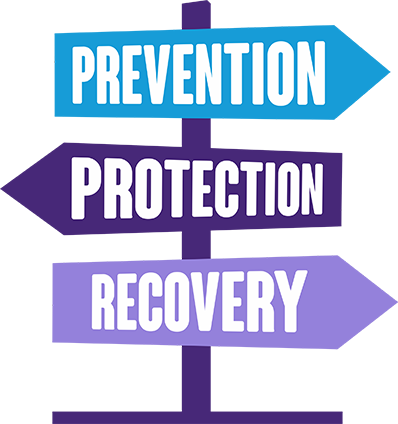Am I being abused?
Am I being abused?
Are you or someone you care about in an abusive relationship? Below we have listed some of the common signs to look out for. We have also included a helpful video produced by Wakefield Council that illustrates the nature of domestic abuse including how controlling and coercive behaviour can intensify over time and the impact this can have.
What are the signs?
Domestic abuse can take many forms and is not always easy to recognise. Here are some common signs to look out for:
Verbal abuse
This includes shouting, mocking, accusing, name-calling, and threatening you with words. It can also involve making you feel bad about yourself or your abilities.
Pressure tactics
Abusers may use threats to control you, such as withholding money or taking away your phone or car. They may also threaten suicide or take away your children, or report you to welfare agencies unless you comply with their demands.
Disrespect
This can include persistently putting you down in front of others, not listening or responding when you talk, interrupting your phone calls, taking money from you without permission, or refusing to help with household chores and childcare.
Breaking trust
This involves lying to you, withholding information, being excessively jealous, having affairs, and breaking promises and shared agreements.
Physical violence:
Hitting, slapping, pushing, choking, or any other form of physical harm.
Emotional abuse
Name calling, manipulating, controlling, or belittling behaviour, threatening to harm loved ones or pets.
Isolation
Restricting access to family, friends, or other support systems. Monitoring or blocking your phone calls, telling you where you can and cannot go, or preventing you from seeing friends and family.
Financial abuse
Controlling finances or limiting access to money.
Sexual abuse
Any unwanted sexual contact, pressure to perform sexual acts or unwanted sexual comments.
Stalking
Monitoring or tracking your movements, or threatening to do so.
Harassment
Following, checking up on you, repeatedly calling or texting, messaging you. Opening your mail or email without permission, or embarrassing you in public.
Threats and intimidation
This can involve making angry gestures, using physical size to intimidate you, destroying your possessions, punching walls, wielding a knife or gun, or threatening to harm you, your children, pets, or people you care about. Other means to instil fear or control
Denial
Abusers may deny that the abuse is happening, blame you for their behaviour, or pretend to be gentle and patient in public. They may cry and beg for forgiveness, or promise that it will never happen again.
It is important to remember that domestic abuse can happen to anyone, regardless of gender, age, race, or sexual orientation. If you or someone you know is experiencing domestic abuse, it is important to seek help and support from a trusted friend, family member, or professional.
In a new relationship? Be aware of these early warning signs/red flags that could indicate the person is an abuser.
Abusers often portray themselves as charming, attentive, romantic, and supportive at the beginning of a relationship. They put on a facade, a deceptive outward appearance, and only reveal their true selves once they have gained their partner's trust and love. Their goal is to establish and maintain power and control over their partner.
Red Flags
 Jealous and possessive: They want to be with you constantly and accuse you of cheating or liking other people. They may follow you and constantly call or text. Keep in mind that this behaviour is not a sign of caring, but rather an attempt to control you.
Jealous and possessive: They want to be with you constantly and accuse you of cheating or liking other people. They may follow you and constantly call or text. Keep in mind that this behaviour is not a sign of caring, but rather an attempt to control you.
Gets too serious too fast: They claim love at first sight and pressure you for commitment. They push for instant closeness and don't allow the relationship to grow at a pace that's comfortable for you.
Love bombing/puts you on a pedestal: They compliment you in a way that's over the top, shower you with gifts, and say "I love you" very early on in the relationship.
Isolation: They make you feel guilty for wanting contact with family and friends or for participating in activities outside the relationship. They put down your loved ones and may try to convince you that you don't need them.
They scare you: You feel on edge and like you're walking on eggshells around them.
Gets angry/aggressive quickly: They may use verbal abuse or physical force, like pushing, shoving, or restraining you from leaving the room.
Pressure you to have sex: They may sulk, get angry, or guilt-trip you in order to manipulate you into compliance. They may make sexual or degrading jokes about you, or do and say things that make you uncomfortable.
Attempts to manipulate you: They may say things like "If you really loved me, you would..." in order to manipulate you into doing something.
Hypersensitivity: They're easily insulted and see everything as a personal attack. They may be unpredictable.
Boasts about mistreating others: If you hear that they've been abusive to someone else, such as an ex-partner or family member, and they deny it or blame the other person, this is a significant red flag.
Blames others for problems: They refuse to take responsibility for their own behaviour and always blame someone else.
Uses drugs: They may use drugs as a way to cope with their emotions or to control you.
Disrespectful and cruel to others: They may punish animals or children cruelly, be insensitive to pain and suffering, tease children until they cry, and not treat others with respect.
Constantly moody or agitated: They may have sudden mood changes and seem to have two different personalities.
Doesn't respect your property or privacy: They may invade your personal space and disregard your boundaries.
If you notice any of these warning signs, it's important to seek help and support. Domestic abuse can escalate quickly and become very dangerous, so don't hesitate to reach out for help.
Make an application to the Domestic Violence Disclosure Scheme, also known as "Clare''s Law".
The scheme was named after Clare Wood, who was murdered by her ex-partner in 2009. Her family campaigned for greater protection for victims of domestic violence and the scheme was launched in 2014.
Under Clare's Law you can:
Apply for information about your current or ex-partner because you're worried they may have a history of abuse and are a risk to you.
Request information about the current or ex-partner of a friend or relative because you're worried they might be at risk.
The police will then carry out checks and disclose relevant information if it is deemed necessary to protect you / the individual from harm.
For further information on warning signs of abuse, check out these websites and resources
https://www.ncdv.org.uk/signs-of-domestic-violence/
https://www.helpguide.org/articles/abuse/help-for-men-who-are-being-abused.htm
To determine whether your relationship is abusive, download our domestic abuse warning sign quiz here
Help and support
If you believe you are or may be in an abusive relationship, don’t suffer in silence; speak to a trusted person.
Contact the Support Hub for a free, confidential chat about your situation. We are here to listen. We won’t judge or tell you what to do. You don’t even need to give your name if you don’t want to; you can contact us anonymously.
We can offer you advice and guidance on a range of situations and signpost you to relevant services in the local area.

